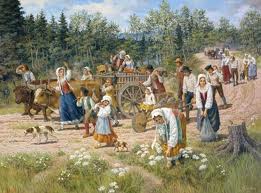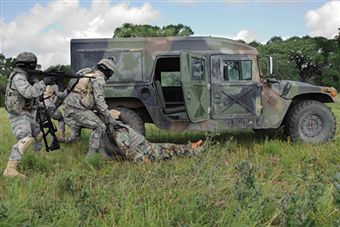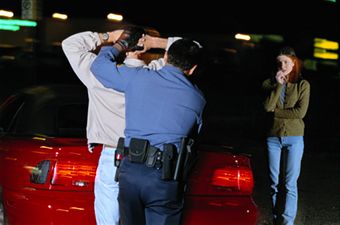اخراج آکادیا ها
The Expulsion of the Acadians
The history of the Americas, from their discovery by Columbus till the founding of modern nation states, has been the struggle among European powers for the largest and richest sections of the continents. In particular, England and France have struggled for control of most of North America. Many tragedies and disasters have marked this conflict, but few have been as heart-rendering as the expulsion of the Acadians in 1755.
“Acadia” refers to what are now the Maritime Provinces of Canada – New Brunswick, Prince Edward Island and Nova Scotia. In 1605, a French expedition under De Monts and Champlain established an agricultural settlement at Port-Royal in present day Nova Scotia. Although Port-Royal and other colonies had very mixed success, there was a gradual increase of French settlement through the seventeenth century. By 1710, the French, or Acadian, population had reached 2,100.
In 1710, Port-Royal fell to the English, and the Treaty of Utrecht in 1713 confirmed British ownership of Nova Scotia and New Brunswick. By this treaty, the Acadians, that is the French-speaking inhabitants, were allowed to stay or leave the country as they pleased.
The majority of inhabitants of Acadia were French and were still being influenced by agents from France and Quebec. This made their loyalty to Britain very doubtful in time of war. Governor Philipps attempted to get the Acadians to swear an oath of allegiance to King George of England. And Philipps was able in 1729 to get the French settlers to agree to a modified oath, with the understanding that they would not have to fight against the French and their Indian allies.
The Acadians remained neutral during the fighting between Britain and France in 1744-45 in Nova Scotia. In 1749, the British established a new capital for Nova Scotia at Halifax, and began to bring in English-speaking settlers. Because of threats from the French and Indians, most of these settlers remained close to Halifax.
British skirmishes with the French and Indians continued, and a new war between France and England was approaching. Governor Lawrence decided that it was time to settle the Acadian question. He ordered the Acadians either to take an unqualified oath of allegiance to England, or to face expulsion from the colony. At that time, in 1755, there were troops and ships from New England in the area, and it seemed like an opportune time to round up the Acadians and ship them out.
When the Acadians refused to take the oath which might oblige them to fight against France, the British rounded up about 6,000 of the 8,000 Acadians, burned their homes, and shipped them away to the British colonies of Virginia, the Carolinas, and as far as the mouth of the Mississippi River. Several of the transport ships sank, drowning all on board, and the Acadians died from disease and hardship.
Since the expulsion order did not come from London, it has been suggested that Governor Lawrence had personal reasons for the expulsion. He may have been greedy for the land and possessions confiscated from the Acadians. Others say that there was the genuine fear for the English position in North America, and that Lawrence was only protecting the interests of the colony.
Acadians still live in Maritime Canada today. Almost 2,000 fled into the woods and eluded the round-up. Another 2,000 Acadians later returned from exile to take the oath of allegiance.
Many stories were told of their sufferings. One tale relates how on the very day of his wedding, a bridegroom was seized by the British and transported from the colony. His bride wandered for many years through the American colonies trying to find him. At last, when she was old, she found him on his deathbed. The shock of finding him, and his death, soon caused her death. This is the story of Henry W. Longfellow’s poem “Evangeline.”
Struggle
Source 1
To fight against somebody/something in order to prevent a bad situation or result
Struggle (against somebody/something) He struggled against cancer for two years.
Struggle (with somebody/something)
Lisa struggled with her conscience before talking to the police.
Source 2
If two people struggle, they fight each other for something, especially something one of them is holding
Struggle for They struggled for possession of the gun.
Heart-rendering
Making you feel great pity
Heartrending stories of children being taken from their parents
Expedition
Source 1
An organized journey with a particular purpose, especially to find out about a place that is not well known
To plan/lead/go on an expedition to the North Pole
Usage note: tripJourney tour expedition excursion outing day outThese are all words for an act of travelling to a place.
Trip an act of travelling from one place to another, and usually back again: a business trip
a five-minute trip by taxi
Journey an act of travelling from one place to another, especially when they are a long way apart
a long and difficult journey across the mountains
Trip or journey?A trip usually involves you going to a place and back again; a journey is usually one-way. A trip is often shorter than a journey, although it does not have to be:
A trip to New York
A round-the-world trip
It is often short in time, even if it is long in distance. Journey is more often used when the travelling takes a long time and is difficult. In North American English journey is not used for short trips:
(British English) what is your journey to work like?
Tour a journey made for pleasure during which several different places are visited:
A tour of Bavaria
Expedition an organized journey with a particular purpose, especially to find out about a place that is not well known:
The first expedition to the South Pole
Excursion a short trip made for pleasure, especially one that has been organized for a group of people:
We went on an all-day excursion to the island.
Outing a short trip made for pleasure or education, usually with a group of people and lasting no more than a day:
The children were on a day’s outing from school.
Day out a trip to somewhere for a day, especially for pleasure:
We had a day out at the beach.
A (n) foreign/overseas trip/journey/tour/expedition
A bus/coach/train/rail trip/journey/tour
To go on a(n) trip/journey/tour/expedition/excursion/outing/day out
To set out/off on a(n) trip/journey/tour/expedition/excursion
To make a(n) trip/journey/tour/expedition/excursion
Source 2
A long and carefully organized journey, especially to a dangerous or unfamiliar place, or the people that make this journey:
an expedition to the North Pole
Another Everest expedition
On an expedition He went on an expedition to Borneo.
Inhabitant
Source 1
A person or an animal that lives in a particular place
The oldest inhabitant of the village
A town of 11000 inhabitants
Source 2
One of the people who live in a particular place
a city of six million inhabitants
Allegiance
Source 1
Person’s continued support for a political party, religion, ruler, etc
To switch/transfer/change allegiance
An oath/a vow/a statement of allegiance
People of various party allegiances joined the campaign.
Allegiance (to somebody/something) to pledge/swear allegiance
He affirmed his allegiance to the president.
Source 2
Loyalty to a leader, country, belief etc
Allegiance toYou owe allegiance (=have a duty to give allegiance) to your king.
Swear/pledge allegianceI pledge allegiance to the flag of the United States of America.
An oath of allegianceSwitch/transfer allegiance (=start to support a different person, group etc)
The people here have strong political allegiances
Neutral
Source 1
Not belonging to any of the countries that are involved in a war; not supporting any of the countries involved in a war
Neutral territory/waters
Switzerland was neutral during the war.
Source 2
1 not supporting any of the people or groups involved in an argument or disagreement:
I always tried to remain neutral when they started arguing.
Clive decided to adopt a neutral position.
The British government acted as a neutral observer during the talks.
2 in a war
Acountry that is neutral does not support any of the countries involved in a war: During World War II, Sweden was neutral.
neutral territory/waters (=land or sea that is not controlled by any of the countries involved in a war)
Skirmish
1 a short fight between small groups of soldiers, etc, especially one that is not planned
Several people were killed in skirmishes during the night.
2 a short argument, especially between political opponents
A skirmish between the two party leaders
source 2
A fight between small groups of soldiers, ships etc, especially one that happens away from the main part of a battle – used in news reports
skirmish with/between/over The young soldier was killed in a skirmish with government troops.
Opportune
source 1
Suitable for doing a particular thing, so that it is likely to be successful
Synonym: favorable
The offer could not have come at a more opportune moment.
Chapman decided the time was opportune for talking business.
source 2
An opportune moment/timea time that is suitable for doing something:
I waited, hoping for an opportune moment to discuss the possibility of a raise
Round somebody up
source 1
If police or soldiers round up a group of people, they find them and arrest or capture them
A number of suspects were rounded up and questioned.
source 2
if police or soldiers round up a particular group of people, they find them and force them to go to prison
Thousands of men were rounded up and jailed.
Ship
source 1
Ship somebody/something + adverb/prepositionTo send or transport somebody/something by ship or by another means of transport
The company ships its goods all over the world.
He was arrested and shipped back to the UK for trial.
source 2
to order someone to go somewhere
ship somebody off/out etc
He was shipped off to a juvenile detention center
Oblige
source 1
Oblige somebody to do something To force somebody to do something, by law, because it is a duty, etc
Parents are obliged by law to send their children to school.
I felt obliged to ask them to dinner.
He suffered a serious injury that obliged him to give up work.
source 2
if you are obliged to do something, you have to do it because the situation, the law, a duty etc makes it necessary
oblige somebody to do something The minister was obliged to report at least once every six months.
Circumstances had obliged him to sell the business.
feel obliged to do something (=feel that you have a duty to do something)
Many parents feel obliged to pay for at least part of the wedding.
! Do not use oblige when you are talking about making someone do something they do not want to do. Use force or make: No one can force (NOT oblige) you to stay in a job that you hate.
Hardship
source 1
A situation that is difficult and unpleasant because you do not have enough money, food, clothes, etc
Economic/financial, etc. hardship
People suffered many hardships during that long winter.
The two men endured great hardship during their trek across Antarctica.
It was no hardship to walk home on such a lovely evening.
source 2
something that makes your life difficult or unpleasant, especially a lack of money, or the condition of having a difficult life:
an economic policy that caused great hardship for many people
Many students are suffering severe financial hardship.
hardship ofthe hardships of war
Possession
source 1
Something that you own or have with you at a particular time
Synonym: belongings
Personal possessions
The ring is one of her most treasured possessions.
Please make sure you have all your possessions with you when leaving the plane.
source 2
something that you own or have with you at a particular time [= belongings]:
He had sold all his possessions and left the country.
I packed my remaining possessions into the trunk.
treasured/prized/precious possession (=one that is very important to you)
This old violin had been her father’s most treasured possession.
Prisoners were allowed no personal possessions.
Confiscate
source 1
To officially take something away from somebody, especially as a punishment
Their land was confiscated after the war.
The teacher threatened to confiscate their phones if they kept using them in class.
source 2
to officially take private property away from someone, usually as a punishment:
Miss Williams confiscated all our sweets.
Many opposition supporters had their goods confiscated
Genuinesource 1
Real; exactly what it appears to be; not artificial
Synonym: authentic
Is the painting a genuine Picasso?
Fake designer watches are sold at a fraction of the price of the genuine article.
Only genuine refugees can apply for asylum.
source 2
a genuine feeling, desire etc is one that you really feel, not one you pretend to feel [= sincere]
genuine interest/concern/desire etc
The reforms are motivated by a genuine concern for the disabled.
a genuine fear of invasion
‘Did he really?’ Her surprise seemed genuine.
Flee into
source 1
To leave a person or place very quickly, especially because you are afraid of possible danger
She burst into tears and fled.
Flee from somebody/somethingA camp for refugees fleeing from the war
Flee to…/into… He fled to London after an argument with his family.
Flee something He was caught trying to flee the country.
The driver had already fled the scene of the accident.
source 2
past tense and past participle fled
writtento leave somewhere very quickly, in order to escape from danger:
His attackers turned and fled.
Masaari spent six months in prison before fleeing the country.
flee to/from/into Many German artists fled to America at the beginning of World War II.
Elude
source 1
To manage to avoid or escape from somebody/something, especially in a clever way
The two men managed to elude the police for six weeks.
source 2
to escape from someone or something, especially by tricking them [= avoid]:
He eluded his pursuers by escaping into a river.
Round-up
source 1
An act of bringing people or animals together in one place for a particular purpose
The round-up of sheep for shearing
The police carried out their usual round-up of Saturday night drunks.
source 2
when people or animals of a particular type are all brought together, often using force
round-up ofa round-up of suspected drug-dealers
the annual cattle round-up

















